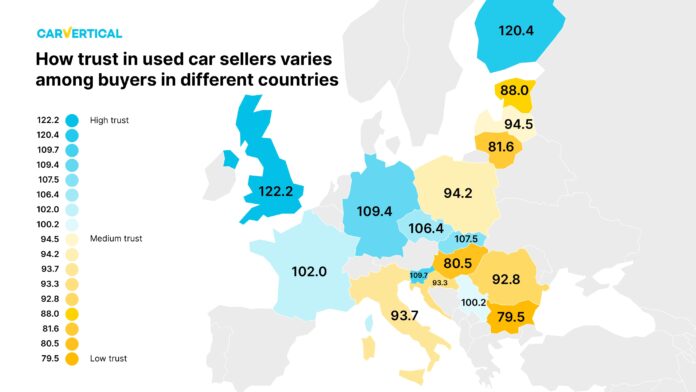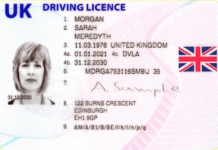Research reveals countries with highest and lowest trust in used car sellers
When buying a used car, trust is everything. However, people in different countries may have a very different level of confidence in the local vehicle market. Experts from carVertical conducted research in 17 countries and did a survey of 4,500 people to determine what they think about used car sellers.
Respondents were asked whether they trust used car sellers, whether they think it’s safe to buy a used vehicle, and whether they expect sellers to deliver on their promises.
The British trust sellers the most
Buyers in Central and Western Europe have more trust in sellers than in Eastern Europe, where various scams are more common.
The countries where people trust sellers the most are the UK (a trust score of 122,2), Finland (120,4), Slovenia (109,7), Germany (109,4), Slovakia (107,5), and the Czech Republic (106,4).
However, high trust in sellers doesn’t mean they are worthy of that trust. In the UK, 14.5% of cars have a clocked mileage reading, suggesting that the used car market is not transparent. Since the British trust sellers more than people in other countries, they may be more vulnerable to scams.
As Matas Buzelis, the automotive expert and Head of Communications at carVertical explains, the UK is very different from the rest of Europe because the share of imported used cars is significantly lower.
“With a smaller import market share, the UK has fewer cross-border used car deals. It means the risk of getting a car with mileage fraud may be lower, but there are different problems in the UK market. Hidden write-offs, issues with outstanding financing may lead to bad car-buying experiences there” – explains Matas Buzelis.
The lowest trust is in Eastern Europe
France (102), Serbia (100,2), Latvia (94.5), Poland (94.2), Italy (93.7), Croatia (93.3), and Romania (92.8) are among medium-trust countries. Buyers in these countries seem to be more aware of dishonest sellers and tend to be more careful when buying a used car.
The lowest trust in sellers is in Estonia (88), Lithuania (81.6), Hungary (80.5), and Bulgaria (79.5).
These countries have a long history of car-related scams. Many vehicles have a clocked mileage or have suffered severe accidents in the past. Since many drivers in these countries have fallen prey to dishonest sellers, the average trust is low.
Buzelis notes that the flow of used cars generally goes from west to east. Usually, vehicles are clocked in the countries they are exported to and then listed in the used car market. Fraudster sellers offer competitive deals, but often only at the cost of a fake vehicle history.
Millennials don’t trust used car sellers
According to the research, 55% of drivers who know a lot about the technical aspects of a car, trust sellers. However, less car-savvy people typically have a lower trust (17.5%).
If the buyer is a skilled mechanic, they can avoid cars in poor condition without risking their money. A person with limited knowledge of cars may have difficulty trusting sellers, as they can’t inspect a vehicle themselves and avoid a bad purchase.
The younger generation is more distrustful of sellers. Only 17.9% of those aged 25-34 trust
used vehicle sellers, compared with 30.3% of people aged 35-44. This may suggest that millennials are more informed about car scams and the potential damage a vehicle in poor condition can bring them.
“The younger generation is also more used to the modern experience of buying things online. Buyers can usually return a used purchase if it doesn’t meet expectations or has defects. However, things are not the same with used cars in some countries, and the whole procedure is much more complicated. Perhaps that may add up to the lack of trust,” says Mr. Matas Buzelis.
Help keep news FREE for our readers
Supporting your local community newspaper/online news outlet is crucial now more than ever. If you believe in independent journalism, then consider making a valuable contribution by making a one-time or monthly donation. We operate in rural areas where providing unbiased news can be challenging. Read More About Supporting The West Wales Chronicle
























